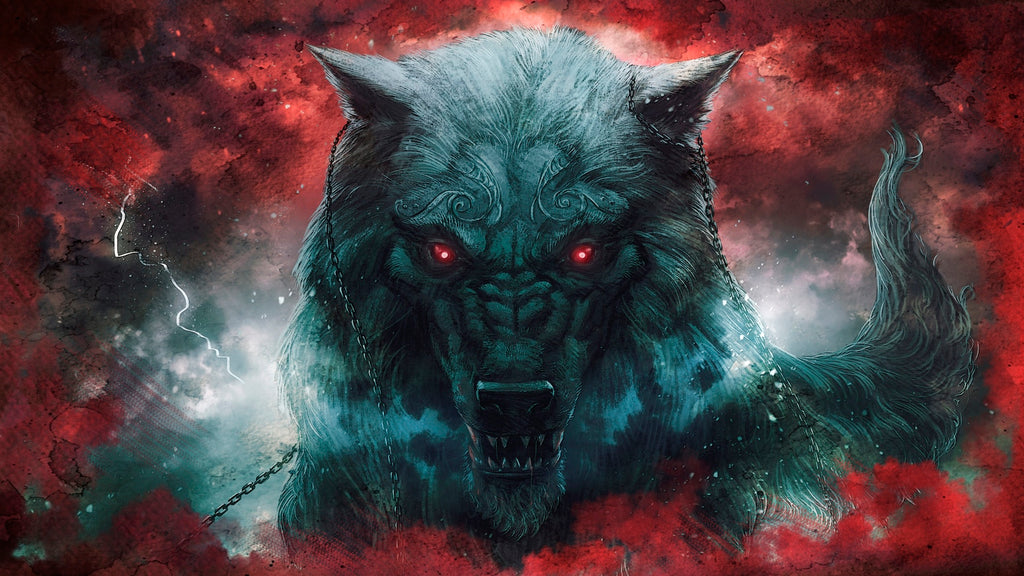Chapter 10: The Binding of Wolf Fenrir
Among all tales of the Norse Pantheon, the binding of Wolf Fenrir must be the most interesting piece. Because from it we can derive not only the values of some Norse characters but also the Viking culture within. So what happened in the Binding of Wolf Fenrir?
GODS COULD NOT SLEEP WHEN FENRIR WAS NOWHERE TO BE FOUND
From the beginning of the myth, the seer prophesied that Odin would fall in his last combat with wolf Fenrir who triggered Ragnarok Doom of Gods. Accordingly, Norse gods were afraid of nothing but the days of Ragnarok to come. Getting rid of their fate meant getting rid of the threats from Fenrir, so Norse gods decided to keep Fenrir with them in stronghold Asgard.
Fenrir was the giant wolf, son of Loki and the giantess Angrboda ("She Who Gives Anguish"). He had two more notorious siblings: Jormungandr the Midgard Serpent and Hel the Queen of the Dead.
But when the children of Loki were yet to wreak any havoc, gods banished them into different places: Jormungandr to the ocean in Midgard, Hel in the underworld land of death, and Fenrir in Asgard.
First, the gods seemed to favour the little pup Fenrir. But the pup grew up at an incredible speed and soon it became a giant wolf whose jaw could stretch from the earth to heaven.

Fenrir was the son of Loki. He was kept in Asgard under the eyes of the gods as a caution preventing Ragnarok in the future.
When the pup became such a monster, no one dared to approach it, let alone playing and feeding the wolf as they used to do. Loki was nowhere to be found when it came to the duties of the father. Instead, Tyr was the only god that approached and fed Fenrir.
THE BINDING OF WOLF FENRIR
Gods decided that the wolf could not stay in Asgard for good. His stay should be temporary for the sake of the gods. But they would not let Fenrir roam freely in Nine Worlds.
Norse gods tried to bind Fenrir. But two attempts of them ended up nowhere as Fenrir easily broke free.
Finally, gods sent a messenger to Svartalfheim land of the dwarves for a magical chain from the most talented craftsmen in Nine Worlds. Then dwarves sent back the magical Gleipnir. It was made with the cat's footstep, the root of the mountain, beard of the women, breath of the fish, and spit of the birds.
Then the gods presented the chain to Fenrir. The wolf was wise enough to smell a rat with this new chain. Unlike the last two big chains, this one was just a ribbon. Feeling something wrong with this chain, Fenrir asked a god to put one hand in his mouth and vow to let him free if he could not break Gleipnir the ribbon.

Tyr, Fenrir, and Gleipnir chain by paperlait on deviantART
As you may guess, Tyr was the only one that dared to put his hand in the mouth of Fenrir and vow. When Fenrir found out that he could not break this little ribbon, he bit and swallowed the hand of Tyr.
The gods brought the bound wolf to the isolated part. Fenrir was left there alone with the binding ribbon. A sword placed in the jaws of Fenrir. As Fenrir howled, a river would flow from his mouth. The river was "Ván" which meant "Expectation" or "Hope". There lay the lonely Fenrir until his time came, he broke free and triggered Ragnarok with his father, Loki.
READING BETWEEN THE LINES
The story revolved around the Binding of Wolf Fenrir but what we want to focus the most is the valuable trait of Tyr God of Justice and Honor. Indeed, in the story, Tyr appeared to be a supporting character who facilitates the flow of the story. But if we look from a different angle, the story is both tell the story and illustrate the values of Tyr.
Tyr was a god of Justice and Honor
Every action of Tyr in the Binding of Fenrir should be respected. Maybe he realized the unfair treatment of the gods with the children of Loki. Ever since the little children could do no harm to the gods, they had banished them into different places separating them from their family.
Tyr fed Fenrir and was the only one daring to approach Fenrir. Was he trying to make up for the lost childhood of this monster?
In the main part of the Binding story, Tyr was again the only one daring to put his hand in the mouth of Fenrir. In fact, losing a hand in this situation was not a big deal with all gods. But breaking their vow was. The gods gave their words to let Fenrir free if he could not break the Gleipnir. But the swearing words were just a trick for Fenrir to try the chain.
What God Tyr sacrificed here was not merely a hand. He sacrificed his honor and values for the good of his clan. The sacrifice of one individual if it could save the whole clan was worth it.
This point seemed to backfire God Tyr. For it did not deprive Tyr of his honor. Rather, it highlighted the values Tyr embodied.
Norse mythology also depicted Odin the Allfather as the figure who often made a sacrifice. But Odin sacrificed himself to himself. For example, he sacrificed to gain more wisdom for himself. Although later Odin spread his knowledge like the ability to decipher runes, he initially embraced the learning journey for himself. Tyr was different. Every move he made seemed to benefit the people surrounding.
Was fate of gods created by Norns or gods themselves?
In the past, the children of Loki were to blame for the fall of gods. Yes, they did trigger off Ragnarok. Yes, Fenrir did kill Odin and Jormungandr did kill Thor.
In Norse mythology, Norns were among the most powerful female figures. Because even Odin the Allfather also God of Gods could not intervene into the Norns' way of thinking. He could do nothing to change what Norns wanted. For this, people believed it was Norns who created the fate of gods and the collapse of the Norse Pantheon.
This question is tricky, to be honest.
We learn that when the children of Loki could do no harm to the world, they were banished into different lands. Was this a fair play from the beginning? No, it was not. I am not trying to blame the gods for what they did but I would like to discuss my view of point. Looking at this point differently gives us a new lesson.
It was gods who created the fate of themselves. For they believed in the words of the seer, they destroyed the family of Loki. This inevitably harboured the seed of hatred within the children of Loki. They were just born when their family separated by gods. This was no fair treatment from the beginning although gods and giants (family of Fenrir) hated each other for long.
So whether the readers accept it or not, the gods were about to reap what they sow. The moral lesson of this point: You will always harvest what you plant, whether good or bad.
Fenrir was the victim
Going with the flow of the previous point, Fenrir was indeed a victim. Being mistreated since birth and being tricked by gods. Being lied to and being bound. Except for the part of Ragnarok, Fenrir always appeared in the passive voice, meaning he could do nothing to change his life.
So the move of triggering off Ragnarok is reasonable if we view Fenrir as the victim in Norse mythology. Obviously, from the beginning, he just did nothing harm. The only harmful image of him appeared in the words of the Seer.




